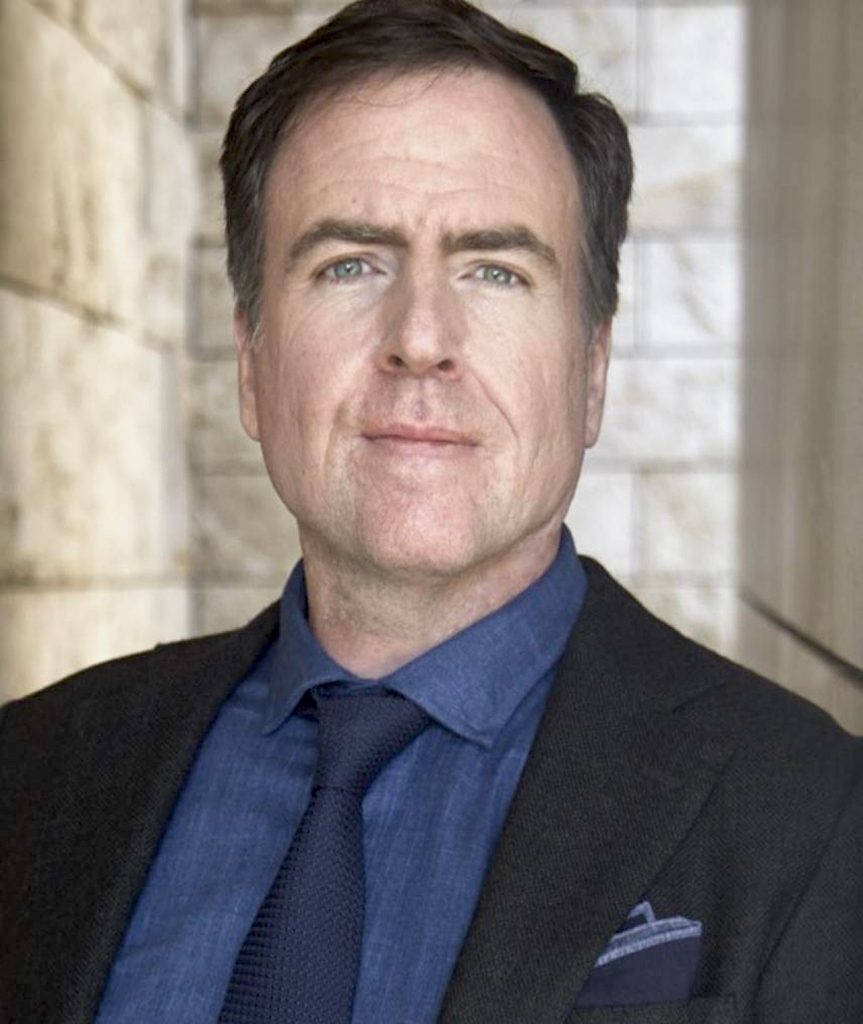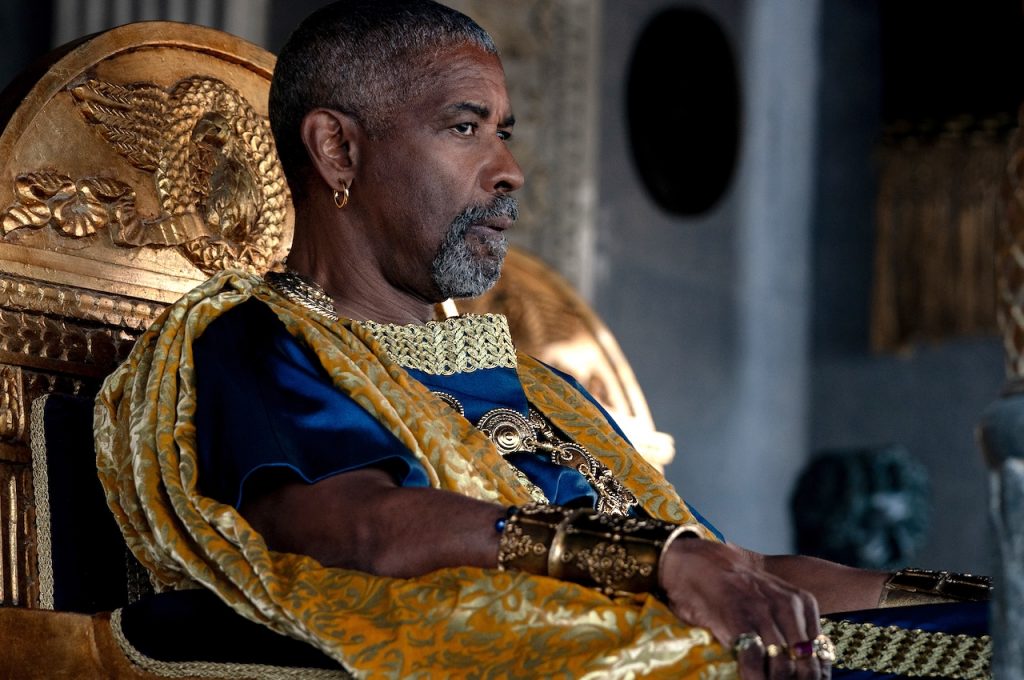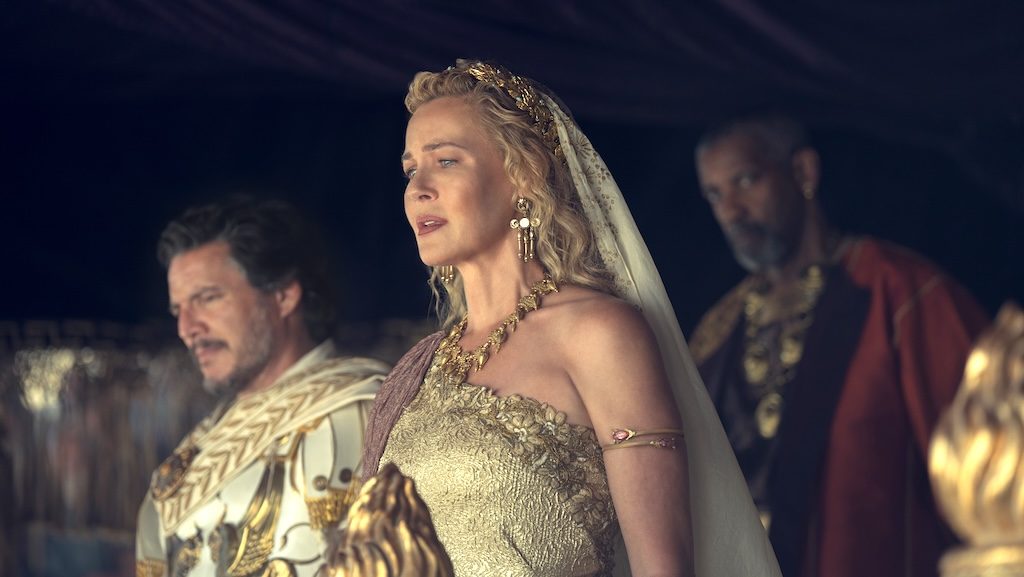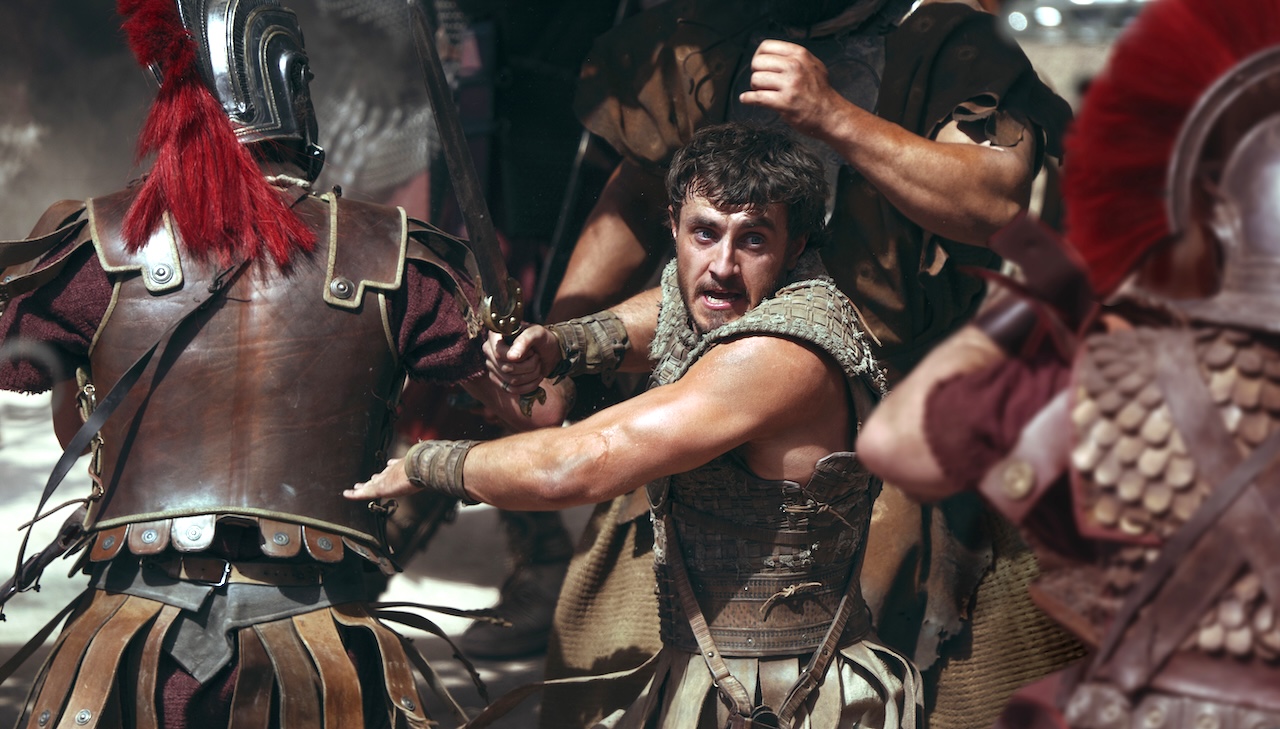Gladiator made cinematic history in 2000 when Russell Crowe played the legendary Maximus Decimus Meridius, the Roman general turned slave who returns to Rome to avenge the death of his family. In the colosseum, he utters his famous line, “Are you not entertained?”
Almost a quarter century later, the historic saga returns to our screens set fifteen years after the death of Maximus. It tells the story of his bitter exiled son Lucius (Paul Mescal) who returns to Rome to give the city back to its people.
Screenwriter David Scarpa, who has a history of working with famed director Sir Ridley Scott with projects including All The Money In The World and Napoleon spoke with Creative Screenwriting Magazine about continuing this epic Roman journey.
Gladiator 2.0
The discussions between Ridley and Scarpa began by deciding to focus on the story of Lucius. There wasn’t a fixed idea of how the story would play out beyond that. Peter Craig (Top Gun: Maverick, The Batman) wrote the original story. Scarpa had no qualms about Craig’s early drafts given his lack of background in historical drama. “I think any writer can write any kind of material. He’s a smart guy and he definitely can tackle that stuff,” states Scarpa.

David Scarpa
[More: David Franzoni Talks ‘Gladiator’]
They didn’t write in tandem. Craig wrote an early draft and later went off to do a TV show, so Scarpa was brought into the mix. “Craig contributed that basic premise, and the rest of it was largely what I did.”
Very soon after the original Gladiator movie, Russell Crowe commissioned versatile Australian musician and filmmaker Nick Cave to write a draft for the sequel that never moved forward.
Despite its historical setting in ancient Rome circa 180 AD, Gladiator still resonates thematically with contemporary audiences. “Ancient Rome has these high stoic Roman ideas, and yet at the same time, there’s profound decadence and corruption in terms of the leaders,” adds Scarpa. “Also, specifically with regard to the gladiator genre, the barbarity of enslaved people going and fighting against each other in the arena for their freedom was captivating.”
“It’s a very primal story, so it inevitably fascinates people. And then inevitably, it’s going to comment on the nature of politics in the present day, or the nature of politics in general, or the nature of society.”
David Scarpa believes the first Gladiator movie was more “idealistic in terms of its heroism.” Maximus had a clear goal from the outset with a distinct moral compass. Lucius enters the arena in Gladiator II from a different place.
“Gladiator II “shades a tiny bit darker. Lucius is a character who’s clearly living in a fallen world. He’s an honorable man in a dishonorable world.”
Writing The Movie
There was no pre-set agenda for Gladiator II other than “simply having a primally viscerally engaging story that is compelling, as opposed to being driven entirely by what you want to say thematically. ‘How do we tell the best tale?’ but inevitably you wind up telling a story that is going to reflect some values and themes,” notes Scarpa.
Gladiator II begins “in a mirror image of the way the first movie starts. Gladiator begins with Maximus, the Roman general, facing off against the barbarians, and we come into the second movie on the barbarian side facing off against the Roman general.”
[More: David Scarpa Discusses Napoleon]
Lucius was first introduced in the first Gladiator film. The main question for his character in Gladiator II, was deciding on the most interesting place to find him in the follow up. “What is the most interesting place to pick up his story and the most interesting direction for Lucius to go?” shares Scarpa.

Macrinus (Denzel Washington) Photo courtesy of Paramount Pictures
“Lucius has effectively done a 180 from his father Maximus. He has done everything in his youth to not be like his him, unconsciously or consciously.”
Lucius initially rebels against his internal anger toward the Roman patriarchy. “He gradually comes to realize who he really is, making peace with it, and recognizing what was good in that father figure.”
Lucius is the emotional nucleus of the story. “That’s the trajectory of somebody who’s going from one place to completely the opposite and finding his way back. How does he find his way back to Rome? Not just physically, but emotionally. How does he find Roman virtue and find the Maximus in himself? That was the heart of the movie.”
Lucilla (Connie Nielsen) represents Lucius’ reconnection to his roots and yearns for a benevolent society, and ruthless businessman Macrinus (Denzel Washington) illustrates an alternative path for Lucius. “Macrinus represents the cynicism and the force of pure power for its own sake.” Marcus Acacius (Pedro Pascal) is also instrumental in shaping Lucius’ journey. He’s almost the embodiment of Maximus and a proxy for the anger Lucius holds.
Despite being essentially defeated and deeply conflicted internally, Lucius persists with his quest through a sense of familial duty and loyalty to Rome.
The ‘gladiator’ genre would be remiss without multiple brutal set pieces in the colosseum. Gladiator II serves the genre with the understanding that these scenes can only be satisfying with a sound dramatic foundation.

General Acacius (Pedro Pascal) and Lucilla (Connie Nielsen) Photo courtesy of Paramount Pictures.
“The biggest challenge with these movies is not having spectacle for spectacle’s own sake. It’s about making sure that every one of these moments represents dramatic conflict,” says Scarpa. Adding set pieces as eye candy “kills the movie.” Furthermore, the dialogue exists to inform the psychology of the characters more than to propel the story.
Each set piece has to have some crucial element of moving the emotional story forward
David Scarpa’s script wrote many drafts before he and Ridley settled on the shooting draft. His first draft came in at around 150 pages which he reduced to 120. Then Ridley Scott cut it back to 80 pages and then they started over. “It’s a constant process of tearing down and rebuilding. It’s a process of fighting over ideas and deciding on how to rebuild the dramatic tissue.”
Ridley Scott is very minimalist in the sense that he likes to cut scenes
